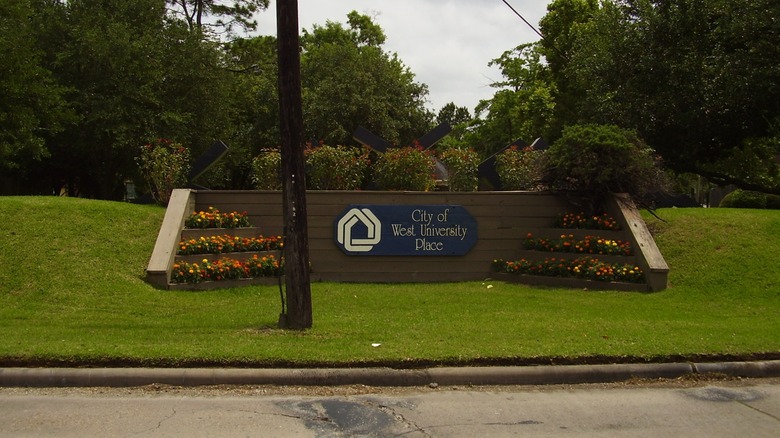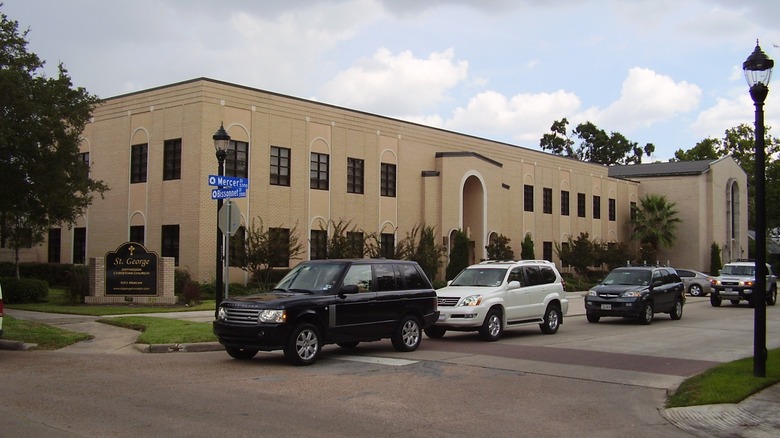This Invisible 'Virtual Gate' Is A Real Texas Crime Stopper
Surveillance systems, from the best doorbell cameras to far more sophisticated setups in secure buildings and other locations, have become a daily part of millions of lives around the world. At this point, there are even solar-powered security cameras and ones powered by Wi-Fi. When taking a walk on an average street, you're very likely to at least be glimpsed by several such cameras without even thinking twice about it. This kind of footage can have a vital role to play in providing the authorities with information when a crime is reported.
West University Place, a Texas city in the Houston metropolitan area with a population of about 15,000, is protected by one elaborate example of these sorts of measures in the form of its Virtual Gate Security Camera System. This isn't a physical barrier or deterrent, but rather a strategically placed system of security cameras that covers the entrances to the city for the protection of residents. The city of West University Place reports that the system received approval in 2018 and consists of groupings of cameras in 40 locations around the city.
In addition to providing live feeds of city entrances, the system also has cameras that track license plates to keep the city's law enforcement in the know. This can help alert police officers to things like stolen vehicles when they enter the city. Here's a closer look at how the so-called Virtual Gate works and some ways that it supports local police teams.
How the Virtual Gate system works
In 2022, the city of West University Place completed the work to install the Virtual Gate system. The city's communications coordinator, Bianca Cuccerre, told the Houston Chronicle that the combination of both surveillance cameras and license-plate tracking technology was what set apart this system from existing surveillance structures. Together, they make for a very effective means of detecting stolen vehicles or those with license plates otherwise known to the broader Texas police. Since its installation, the system has boasted a 97.2% accuracy level of detection.
The project also required significant infrastructure to be installed within the city for the information to be analyzed, collated, and used for the benefit of law enforcement. As such, it was quite a complicated endeavor, and one that was originally budgeted to cost about $4.5 million in total. Though it reportedly came in under budget, it was still costly to implement. The hope, though, is that it continues to pay dividends in the range of knowledge that it provides to the police.
This system doesn't just stop at detecting stolen vehicles and helping police combat crime, however. It can also flag vehicles associated with Amber or Silver alerts, helping track down missing individuals. The continued benefit to the community is sure to be considerable, but some privacy concerns have also been raised as a result of the sheer scale of the project.
The Virtual Gate system could represent a new era of surveillance
While this invisible Virtual Gate has a prominent place to play in the safety of West University Place citizens, it is important to bear in mind that it is able to create a comprehensive database of the movements of all vehicles and drivers. In this city alone, approximately 250,000 license plates are processed by the system's automatic license plate readers every day. Some residents have expressed concern about this degree of surveillance and any potential of this kind a database being hacked.
Of course, these types of concerns are not new. Back in 1987, the University of Detroit Law Review published the study "Video Surveillance on Public Streets: The Constitutionality of Invisible Citizen Searches. As author JM Granholm notes on a U.S. Department of Justice website, "the Supreme Court has held that when individuals are outside their homes or other private places, they have no reasonable expectation of privacy in their public movements."
Decades later, the concerns expressed in this paper remain as relevant as ever — particularly with today's widespread use of drones and other equipment that can pose privacy risks. Still, the Virtual Gate's connection to a wide range of records is something that saves an enormous amount of resources compared to attempting to do so manually. There's no doubt that it has proven to be effective at the role it was created for.


